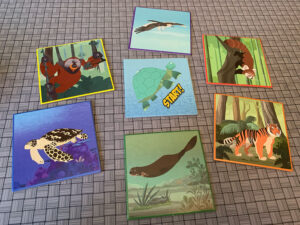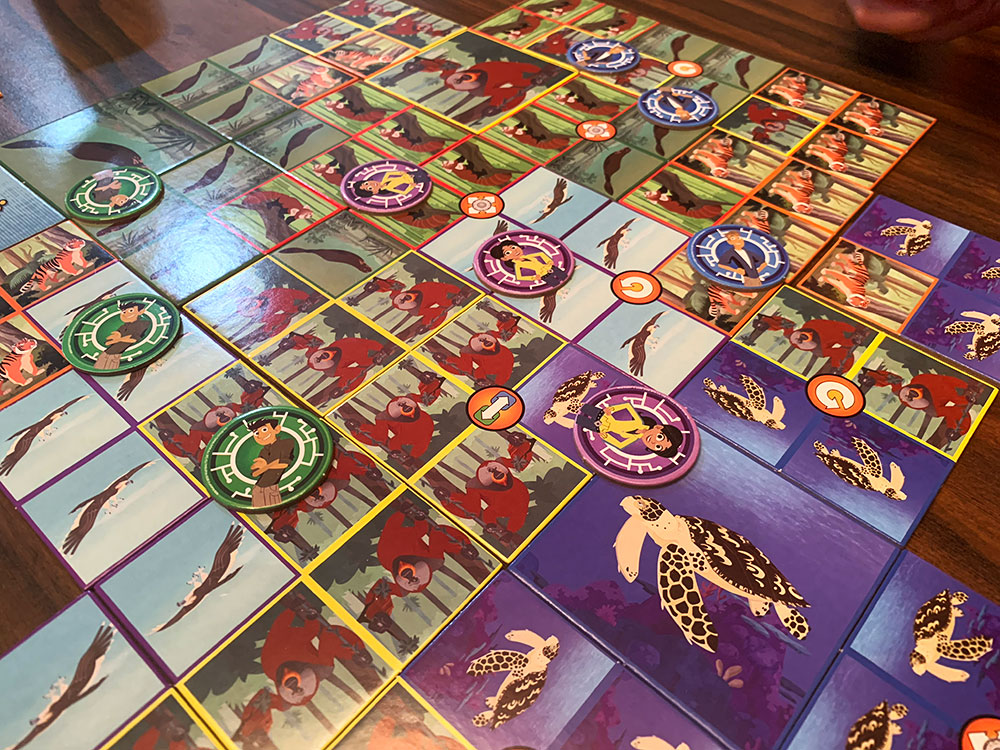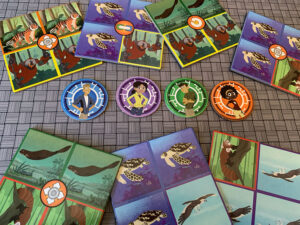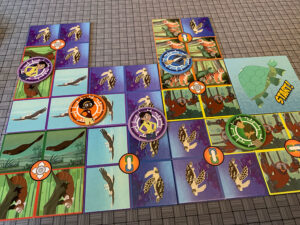 Until recently, IP-based games usually would have most gamers running for the doors, and rightfully so as many were atrocious. About a year ago I was looking for board games for my son with a Wild Kratts theme. Wild Kratts is a show about two brothers and their friends going on adventures that teaches children about animals. The games I found were a Trouble clone, some other roll-and-move game, and a memory-matching game. At the Origins preview page on BGG Endangered Wildlife was listed and my interest was piqued.
Until recently, IP-based games usually would have most gamers running for the doors, and rightfully so as many were atrocious. About a year ago I was looking for board games for my son with a Wild Kratts theme. Wild Kratts is a show about two brothers and their friends going on adventures that teaches children about animals. The games I found were a Trouble clone, some other roll-and-move game, and a memory-matching game. At the Origins preview page on BGG Endangered Wildlife was listed and my interest was piqued.
Is Endangered Wildlife the Wild Kratts game that gamers with young gamers have been looking for? Or would I rather spoon with a porcupine than ever play this again? Read on to find out.
Gameplay Overview:
The game consists of 51 habitat tiles that have either one large animal on it or is subdivided into four quadrants of one or more animals and a Tortuga (start tile) that starts on the table. There are six different animal types in the game and the goal is to build and claim the largest habitat for each animal.

Each player starts each turn with three tiles and your turn consists of adding a tile to the table, building up habitats of one or more animals. Tiles must be played aligned with other tiles (in a grid) but rotated as desired. After playing a tile you can opt to play one of your creature power discs to claim that habitat if it’s currently unclaimed and it can still grow or shrink after claiming it. Any tile being touched by a power disc is locked and can’t be moved. Power discs can cover a single space or split across two or four spaces that all share the same animal. These locking tiles are important as some of the tiles have icons that allow you to do one of the following actions on your turn:
- Rotate any unlocked tile
- Swap two unlocked tiles and, optionally rotate them
- Move a power disc to a different area of the same animal type.
You can only play one power disc per animal type so that red panda loving friend of yours can’t claim multiple red panda habitats. Fun aside, my avatar on Discord has me wearing a red panda hat. Or maybe it’s a trash panda hat.
After all the tiles have been played, add up the size of each of their six habitats and whoever has the largest sum is the winner.

Game Experience:
This game is very simple to explain and play but there’s some real strategy at play with the special actions and when to claim habitats making it an area control game of sorts. The game can also be as savage as a ticked-off honey badger as players can interfere with each other.

I don’t think the intent of the game was intended to be mean-spirited and I’ve had games where everyone was focusing on improving their own little areas as opposed to trying to impede each other. I’ve also had my son go full Zack Varmitech on me by swapping tiles that took areas away from me and gave them to himself.
There’s a tough decision for when to claim a habitat which gets tenser as the player count increases. Meanwhile, if you grab one too early it’s easy to get closed off, limiting your habitat size. There is also a luck factor in whether there will be anything worth trading up to if you also have a tile that will allow you to move a power disk.
Having three tiles to always pick from, except for the last few turns when everyone’s hand size dwindles, gives you some choices without being overwhelming which makes this excellent for families. The rules also include an easier version of the game where you split the tiles of the large animals between the players and focus on just those two to three animal habitats.

The tiles are nice and feature art either from the show or in the style of the show with the animal pictures and the character tokens. One small complaint I have is I would’ve liked each power disk to be marked with an animal icon or color to make it easier to tell what you’re still looking for just by taking a quick look at the power disks still in your possession. And while I’m being critical, a space for summing the scores on the scorepad would be nice.
Despite the presence of four main characters (Chris, Martin, Aviva, and Koki) in the Wild Kratts show and the animal art there’s not a lot of thematic depth here. The game does come with a fold-out poster about the animals in the game that contains some facts but that is the extent of the educational value of the game.
Final Thoughts:
A lot of games, especially family games, based on intellectual properties are not good. I’m happy to report that this is actually a good game with the Wild Kratts theme. The theme may be pasted on but if you and your kids like the Wild Kratts show, this is a good competitive game featuring them. So, no cuddling with Quilber for me, thank you very much.
Final Score: 3.5 Stars – Wild Kratts Endangered Species is a solid entry-level area control game that’s fun for adults and kids.
 Hits:
Hits:
• Family game with a good decision space that won’t overwhelm most players
• Streamlined rules makes this easy to teach
• Includes variants to play with younger children
Misses:
• Game can get a little savage
• Need to keep track of which animals already have one of your power disks on them






















Looking through the rules, it doesn’t say that you can only claim one area per animal type. That might be why they didn’t put different types on the tokens.
Thank you for reading.
Under the section titled “Creature Power Discs” the first sentence says “Each player has 6 Creature Power Discs, one for each animal and their habitat.” I would interpret that as you can only claim one area per animal type. If you’ve used them differently, I’m curious how that changes the gameplay, if at all. Do you think it makes it better?